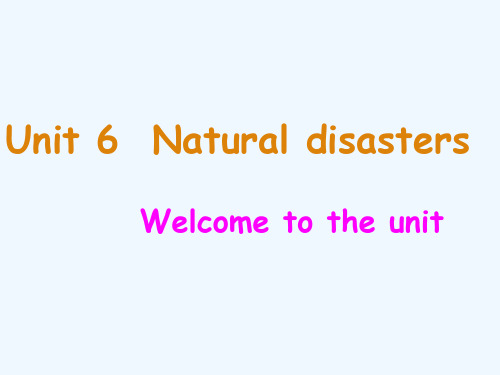八年级英语上册 Unit 6 Natural disasters-Reading (Ⅱ) 课件 牛津版
unit6 natural disaster 第一课时

What’s the weather like? It’s rainy.
flood
rainstorm
wash away 冲走
snowstorm
sandstorm
lightning
thunder
start a fire
earthquake
Do you remember WenChuan earthquake?
Discussion:
If we meet a natural disaster and we are alive, what can we do? (earthquake, rainstorm, thunder and lightning)
love life & love nature
Class reflection
6. fall off the tree
• 1.台风来时男孩正在步行回家。
The boy _______ ___________ home walking was when the typhoon came. • 2.雷电来临时女孩正在卧室里做家庭作业.
homewok doing _______ the girl ________ __________in her bedroom when the _________and lightning came? • 3.暴雨来时人们正在家里吃晚饭。 having People ________ __________dinner at home when the rainstorm came. were was
Step 9. Do exercise
1.输掉比赛 2.半小时后 3.成千上万 4.冲走村庄 5.引起大火 6.从树上摔下
江苏地区 牛津译林版八年级上册英语课件 8A U6 mainta

Timmy’s notes about earthquake
Intro- Place Taiwan duction
Time 15th July, 1999
During Hear
the See disaster
Unit6 Natural disasters
Main task
By Qian Jing
Listen to the tape
•
After the snowstorm, many people were working hard to remove the snow.
Can you complete Sandy’s story?
A bit more love, a much more
wonderful world!
Thank you !
See After the Do disaster Feel
water everywhere stay at home until August 3rd terrible.
Can you write about one of these natural disasters?
What can we do to help those people who are suffering(受苦) from natural disasters?
I stayed at Millie’s home that night. I heard the noise of traffic the next morning. I looked out of the window and saw that people were working hard to remove the snow.
八年级英语上册-Unit-6-Natural-disasters-课件一-牛津译林版

3. I _w_a_s_sl_e_ep_in_g_ (sleep) when it started to rain.
三、单项选择
(B ) 1. Which of the following is not a natural disaster?
home alone?
It’s raining. My house is all wet. Can I come in, Eddie?
Sure, come in.
I was sleeping when it started to rain.
Did you hear the rain?
Not until half an hour later. You must come home with me now.
A. Lightning B. A car accident C. Sandstorm D. Typhoon
( D)2. _________goes before thunder.
A. Typhoon B. Rain
C. Storm
D. Lightning
( C )3. A dog _______ the tree and died.
Unit 6 Natural disasters
Welcome to the unit
Task One
Talk about some common weather.
snowy
windy
rainy
Task two
Learn about the bad weather.
牛津译林版八年级上册英语《Natural disasters》PPT习题课件

可数名词。catch fire意为“着火”,强调动作,其同义短语为
__b_e_o_n_f_ir_e____,强调_状_态______。 [搭配] ___p_ut_o_u_t_th_e__fir_e____ 灭火 __m__ak_e_a__fir_e_______ 生火
知识点 2 thousands of... 成千上万的......
eg: Thousands of people are planting trees on the hill. 成千上万的人正在山上种树。
考向【重点】 它已经不是确切地要表示“千”的意思了, 如thousand前有具体的数字修饰时,则 thousand后就不加s。 如:two thousand 两千
[拓展]类似用法的单词还有hundred, million, billion。
[注意]英语中新闻标题有一套独特的语法体系。一方面,常省 略冠词、系动词等,以节省版面;另一方面,常采用一般现在 时,以突出其新奇感觉
活学活用
2.(1)Every year, __C______ books are donated to the children in poor areas. lion lions lions of lion of
活学活用
3.Last Saturday a car __c_r_as_h_e_d_________(撞到) a big
tree.
into
4 Flood washes away village. 洪水冲走村庄。 [探究] wash意为“冲掉,冲走”,常与__a_w_ay____连用。如果 ___代_词____作宾语,必须放在wash和away中间。 [拓展] wash还可译为“洗,洗涤”。
牛津译林版初中八年级英语上册 《Natural disasters》PPT习题课件

3.LastSaturdayacar_c_r_as_h_e_d_i _________(撞到)
abigtree.
nto
4 Floodwashesawayvillage. 洪水冲走村庄。 [探究] wash意为“冲掉,冲走a”wa,y 常与 __代__词____连用。如果________作宾语,必须放 在[拓w展as]hw和asahw还ay可中译间为。“洗,洗涤”。
Unit8 Naturaldisasters
Welcometotheunit
1.upadv.________ 2.earthquaken.________
课前自主预习
1.up adv完._全__地_____
2.earthquake n地.震________
单
3.coach n.长途__汽_车_____
7.小男孩
Who will ________从__树_上__摔___ the water if I go home without you?下伤来了,腿弄。
4.地震使成千上万的人丧生。
thousand
Earthquake killsso_f ____5.长途汽车撞到树上。
3 Coachcrashesintotree. 长途汽车撞到树上。 [探究] crash为不_及_物______动词,意为“猛撞;碰 撞c”ras。hin常to 用短语为____________,意为“撞 到[拓”展。] crash也可以用及作物________动词,意为 “撞击;砸碎”。
活学活用
句 型
Coach _ct_or_as_h_e_si_n_________ tree.
6.洪水冲走村庄。
在
Flood _w_a_s_h_e_sa_w_a_y_______ village.
牛津译林版八年级英语上册unit6单元知识点归纳

第六单元知识点归纳三、重点句子及句型:1.I didn't hear the rain until half hour later .2.Who’s going to mop it up if you don’t come with me?3. A young boy fell from a tree and hurt his legs.4.At first, I felt a slight shaking through my body.5.People ran in all directions. They didn’t know where to go.6.Some people ran out of the shopping centre. I tried my best to run out to the street, too.7.People ran wildly as pieces of glass and bricks fell down. Then the walls began to come down too.8.I did not even know where I was(宾语从句,陈述性语序).9. A moment of fear went through my mind but I told myself to calm down since I was still alive.10.People were in a great hurry to move away the bricks and stones.11.He survived the earthquake in 1999.12.It rained/snowed heavily last night.= There was a heavy rain/snow last night.13.How heavily it rained last night ! What a heavy rain last night !14.Why didn't your father drive you to school as usual ?15.His car broke down because of the bad weather .16. A man named Su Ning called the 110 using his mobile phone.17.Mr Su felt cold and frightened but he was not badly hurt.18.Bad weather sometimes causes natural disasters.19.Her school caught fire because lightning hit it.20.The video shows the terrible situation after the earthquake .21.I could no t see anything at al l .22.What happened to me !23.I told myself I must stay alive .1.直到半小时之后我才听到雨声。
牛津译林版英语八年级上册《Natural disasters》Reading1

He screamed when he heard some noise above him.
brave clever
+ohethlpers’=
bright daylight
Make an interview!
Reporter: Good morning. You were so
lucky to survive the earthquake.
when the earthquake came (Para. 1-2)
after the earthquake (Para.3-5)
Group work Para.1-2
When the earthquake came, what did Timmy …?
feel a slight shake
a loud noise like thunder
3.You can stay in the corner. Remember : the most important thing is to protect your head.
If you are trapped in the earthquake:
Calm down. Don’t eat your things quickly if you have. Try to find your way out. Shout for help.
No matter what terrible disasters you are facing,
Homework
1.Write a report about Timmy. 2.Try to finish the exercises on P95-96.
Thank you!
八年级英语上《8A Unit 6 Natural Disasters》实践报告 牛津

“8AUnit 6 Natural disasters(Integrated skills)”教学实践报告(指导思想,设计方法等说明)“自然灾害”是人类依赖的自然界中所发生的异常现象,自然灾害对人类社会所造成的危害往往是触目惊心的。
学生所熟知的自然灾害有地震、火山爆发、泥石流、海啸、台风、洪水等突发性灾害.人类要从科学的意义上认识这些灾害的发生、发展以及尽可能减小它们所造成的危害,这已是国际社会的一个共同主题。
八年级学生对自然灾害相关知识了解的已经不少,联系生活在课堂上应该有较强的口语表达能力,所以如果采用观看video,穿插各种相关问题设计、自主学习、分组讨论的方法,学生对本课学习将会有浓厚的兴趣,且学生能够充分发挥想像讨论出各种自然灾害带来的后果及正确处理方法。
从课程本身来讲,本节课为牛津英语8A第6单元Natural disasters的第七课时,是综合技巧的学习和运用,其中包括英语听,说,读,写四个部分的综合训练。
通过读和听获取有用的信息,掌握听力材料中如caller, cover, be covered with, arrival, serious, weather condition等四会单词和词组,并能够完成相关练习;能通过阅读和听录音获取有关信息,了解紧急求助电话中需用到的关键表达法。
同时要求学生根据从A1、A2录音中获取的信息完成A3中的一份事故报告单,培养细听技能。
从而提高学生听说读写的综合语言运用能力。
能模仿书本第103页Part B中 Sandy 和Amy的对话,谈论各种natural disasters,掌握相关句型表达,并进行简单的谈论从而指导并运用现实生活中遇到的各种自然灾害。
在教学设计中,抓住上述特点,根据课程需要,设定了一系列相关问题,让学生在事先找好的“自然灾害网页”上,查找、搜集、整合相关资料,形成结果。
如本章节是由一个听力练习表格,一个在此基础上完成邮件的练习以及一个谈论自然灾难的对话组成的。
- 1、下载文档前请自行甄别文档内容的完整性,平台不提供额外的编辑、内容补充、找答案等附加服务。
- 2、"仅部分预览"的文档,不可在线预览部分如存在完整性等问题,可反馈申请退款(可完整预览的文档不适用该条件!)。
- 3、如文档侵犯您的权益,请联系客服反馈,我们会尽快为您处理(人工客服工作时间:9:00-18:30)。
2. calm vi.
calm可用作不及物动词,意为“平静下
来,镇定下来”,多与down连用。例如:
I asked him to calm down.
我让他平静下来。
Calm down and tell me what happened.
镇定点,告诉我发生了什么事。
calm也可用作及物动词,意为“使平静, 使镇定”。例如: The teacher tried to calm the frightened children. 老师努力使受惊的孩子们平静下来。 ★此外, calm还可用作形容词,意为 “镇静的, 沉着的”。例如: Keep calm, and don’t be afraid! 沉住气, 别害怕!
Fear: in fear screamed a moment of fear Hope: were very frightened was afraid dark could not see at all
calm down
bright daylight
still alive
safe
Find the following phrases from the text: 1. 惊恐地
Yes, I think so. Because pieces of glass
and bricks were falling down.
6. What did you feel when you found yourself trapped? A moment of fear went through my mind but I told myself to calm down. 7. Did you shout for help? Yes, I did. But no one came for a long time. 8. Did you eat anything before you were saved? Yes, I did. I ate some chocolate.
10. 移走, 拿开
move away
direction n. direction可用作可数名词,意为“方向;
指示,说明”。表示“在哪个方向”常用
in the direction of这一结构;表示“指
示,说明”时,常用复数形式。例如:
She turned in the direction of Green Street. 她转向了格林大街的方向。
2. 向四处奔跑 in fear run in all directions where to go begin to come down calm down
3. 该去哪
4. 开始倒塌
5. 冷静下来
6. 根本看不见 7. 处于困境中 8. 一阵恐惧 9. 匆忙地
can not see at all be trapped a moment of fear in a great hurry
ቤተ መጻሕፍቲ ባይዱ
1.be trapped 2.calm down
3.thunder 4.scream 5. come down
a. stop being nervous or excited b. kept in a place and could not move c. shout loudly d. the loud noise following lightning e. fall
There are a lot of words in the text which describe noise, movement, fear and hope
Noise: thunder scream real noise bombs shout for help Movement: a slight shaking started to shake ran wildly ran in all directions walls began to come down pieces of glass and bricks fell down
1. ...I did not know if anyone was
around me. 该句中的if不是“如果”的意思,而 是“是否”的意思,常用于ask, wonder, see, know等动词之后,引导宾语从句,
牛津版 八年级 (8A) Unit 6
1999 Taiwan
earthquake
over 1700 people died
Suppose you are Timmy and your partner is a reporter,
now he is interviewing you
about the following questions.
4. What did you do when earth started to shake? I tried my best to run out to the street.
5. Do you think it is dangerous to run
wildly during the earthquake?
1. Where were you when the earthquake started? I was in a shopping centre. 2. What were you doing? I was doing some shopping. 3. What did you feel and hear at first? I felt a slight shaking through my body. Then I heard a loud noise like thunder.
Follow the directions on the medicine bottle. 遵循药瓶上的说明(吃药)。 ★此外,direction也可用作不可数名词, 意为“指导, 指点”等。例如:
I made more progress under the direction of my teacher. 在老师的指导下, 我取得了更大的进步。
